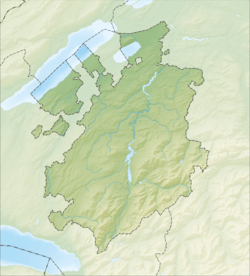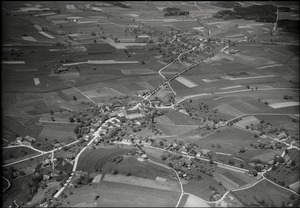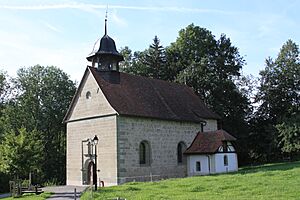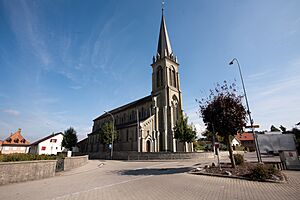Farvagny facts for kids
Quick facts for kids
Farvagny
|
||
|---|---|---|
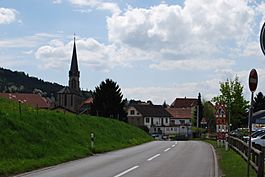 |
||
|
||
| Country | Switzerland | |
| Canton | Fribourg | |
| District | Sarine | |
| Area | ||
| • Total | 10.03 km2 (3.87 sq mi) | |
| Elevation | 700 m (2,300 ft) | |
| Population
(Dec 2014)
|
||
| • Total | 2,215 | |
| • Density | 220.84/km2 (572.0/sq mi) | |
| Postal code |
1726
|
|
| Surrounded by | Autigny, Corpataux-Magnedens, Cottens, Hauterive, Le Glèbe, Pont-en-Ogoz, Rossens, Vuisternens-en-Ogoz | |
Farvagny was a town, also called a municipality, in Switzerland. It was located in the Sarine district within the Fribourg canton.
Farvagny was created in 1996. This happened when four smaller towns joined together: Farvagny-le-Grand, Farvagny-le-Petit, Grenilles, and Posat. Later, on January 1, 2016, Farvagny merged with other towns. These were Corpataux-Magnedens, Le Glèbe, Rossens, and Vuisternens-en-Ogoz. Together, they formed a new, larger municipality called Gibloux.
Contents
Geography of Farvagny
Farvagny was located in the Sarine district. It covered an area of about 10 square kilometers (about 4 square miles).
Here's how the land in Farvagny was used in 2009:
| Type of Land | Area (km²) | Percentage |
|---|---|---|
| Agricultural land | 6.62 | 66% |
| Forested areas | 2.09 | 20.8% |
| Built-up areas (buildings and roads) | 1.2 | 12% |
| Water (rivers, streams) | 0.09 | 0.9% |
| Unproductive land | 0.03 | 0.03% |
| Total | 10.03 | 100% |
Most of Farvagny's land was used for farming. A good part was also covered by forests. About 12% of the land had buildings and roads.
Farvagny's Coat of Arms
The coat of arms for Farvagny has a special design. It shows a blue lion walking on a red background. There is also a gold stripe across it, with two silver maple leaves.
This coat of arms is a mix of the symbols from the four towns that formed Farvagny. The lion and the gold stripe came from Farvagny-le-Petit and Posat. The maple leaves were taken from Farvagny-le-Grand.
People of Farvagny (Demographics)
In 2014, Farvagny had a population of 2,215 people. About 9.9% of these people were foreign nationals in 2008. Over ten years (from 2000 to 2010), the population grew by 20.1%. Most of this growth was from people moving into the town.
Languages Spoken
In 2000, most people in Farvagny spoke French. About 92.1% of the population used French as their main language. The second most common language was German, spoken by 4.7% of the people. A small number of people also spoke Portuguese (1.0%) or Italian.
Where People Were Born
In 2000, about 32.6% of the people living in Farvagny were born there. Another 41.9% were born in the same canton (Fribourg). About 13.5% were born elsewhere in Switzerland, and 8.9% were born outside of Switzerland.
Age Groups
In 2000, children and teenagers (0-19 years old) made up 31.1% of the population. Adults (20-64 years old) were 58.8%. Seniors (over 64 years old) made up 10.1%.
Households
In 2000, there were 616 private households in Farvagny. On average, there were 2.8 people living in each home. Most apartments were lived in all year round.
Population Changes Over Time
The chart below shows how Farvagny's population has changed over many years:

Important Heritage Sites
Farvagny has two important historical buildings. These are the Chapel Notre-Dame and the Church of Saint-Vincent. Both are listed as Swiss heritage sites of national significance. This means they are very important cultural treasures for the country.
Economy and Jobs
In 2010, Farvagny had an unemployment rate of 3.3%. This means a small number of people looking for work could not find a job.
Types of Jobs
In 2008, there were 533 full-time jobs in Farvagny. These jobs were divided into three main types:
- Primary sector: This includes jobs related to nature, like farming. There were 57 jobs in agriculture.
- Secondary sector: This includes jobs in manufacturing (making things) and construction (building things). There were 246 jobs in this sector. Most were in construction.
- Tertiary sector: This includes jobs that provide services, like shops, restaurants, schools, and hospitals. There were 230 jobs in this sector. Many were in healthcare and education.
Commuting
In 2000, many people who lived in Farvagny worked outside the town. About 652 people left Farvagny for work, while 308 people came into Farvagny to work. Most people (77.8%) used a private car to get to work. About 7.2% used public transportation.
Religion
According to the 2000 census, most people in Farvagny were Roman Catholic. About 80.9% of the population belonged to the Roman Catholic Church. Another 5.7% belonged to the Swiss Reformed Church. A small number of people were also Orthodox Christian or Muslim. Some people did not belong to any church.
Education
In Farvagny, many people have completed good levels of education. In 2000, about 29.9% of the population had finished upper secondary education. This is like high school. Also, 11.4% had completed higher education, such as going to a university.
The School System
The school system in the Fribourg canton works like this:
- Kindergarten: One year of non-required kindergarten.
- Primary School: Six years of primary school.
- Lower Secondary School: Three years of required lower secondary school. Students are grouped by their abilities.
- Upper Secondary School: After lower secondary, students can choose a three or four-year upper secondary school. This can be a gymnasium (which prepares them for university) or a vocational program (which prepares them for a specific job).
- Tertiary School: After upper secondary, students can go to a university or continue their apprenticeship (on-the-job training).
Students in Farvagny
During the 2010-2011 school year, there were 603 students in Farvagny.
- There were 62 kindergarten students.
- There were 140 primary school students.
- There were 401 lower secondary students.
Some students from Farvagny went to schools in other towns for upper secondary or higher education. Also, some students from other towns came to Farvagny for school.
See also
 In Spanish: Farvagny para niños
In Spanish: Farvagny para niños
 | Laphonza Butler |
 | Daisy Bates |
 | Elizabeth Piper Ensley |




